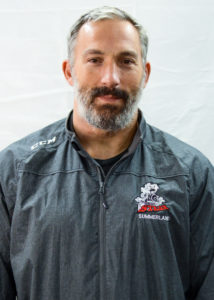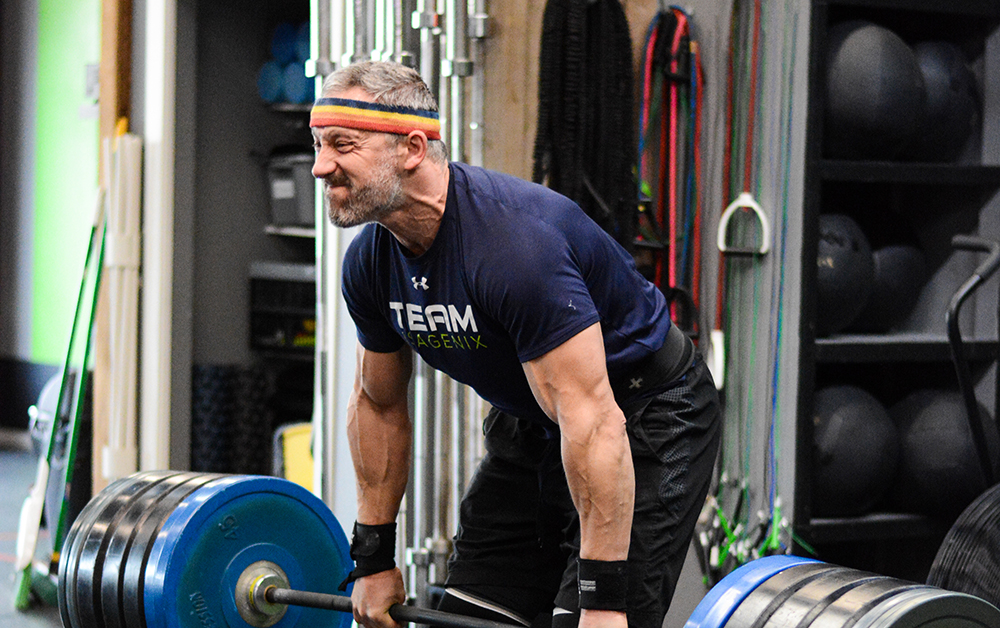CrossFit has impacted Nick Deschenes life in two ways. Not only has it made the news Summerland Steam bench boss a better coach, it’s helped improve his quality of life away from the rink.
After being relieved of his duties as coach-GM of the Trail Smoke Eaters in the B.C. Hockey League, CrossFit entered the picture. The pressures of coaching at the junior A level got to Deschenes, as it impacted his diet and sleep. Needing to commit to bettering his health, the Morinville, Alta., native turned to CrossFit, which Deschenes had heard about, but “never connected the dots.”
“When I did, it was a match made in heaven,” says Deschenes, who recently competed in the virtual International Functional Fitness Federation World Cup in the 40-44 age group.
During the last four years, Deschenes also coached at the minor hockey level with West Kelowna bantam Tier 2 and Kelowna bantam Tier 2, then the desire to coach at the junior level returned. His life was back on track and his son is in Kelowna. The family factor made the Okanagan the only area he was willing to accept a position.
Deschenes returns to the KIJHL where he began coaching junior. The former Philadelphia Phantom (AHL) joined the Grand Forks Border Bruins as an assistant coach in 2011-12, then became the head coach the following season.
“It’s a new challenge,” says Deschenes, who guided the Border Bruins to a 6-7-1-0 record as head coach before joining the Smoke Eaters. “Almost 10 years later, I know I have learned a good amount and improved as a coach. Hopefully that will show in the players that we develop and hope they move on, and in the success we have as a group.”

Tami Quan photo
Deschenes is taking a different approach now with coaching. He credits working with younger teenagers in a gym environment, where he is relaxed, and has taken a more teaching approach. In his playing days, coaches communicated differently. Although when he reached the professional levels, those coaches molded him into a mentally tougher athlete.
“I was able to persevere through a lot of ups and downs because my coaches were hard and had high expectations. That is what I needed as a naive young hockey player,” he says. “What I’ve come to realize is that each player needs something different.”
Deschenes won’t have an issue telling players why he wants them to do something a certain way because he’s a cerebral coach.
“I like to keep the standards as high as possible with their play and execution,” he says. “I feel I can also back it up with the knowledge of why they are doing what they are doing. Communication and teaching are things I want to do better as a coach in my second stint at the junior level.”
Always seeing himself as a developmental coach, Deschenes wants to work with motivated and driven players. That was his approach in Grand Forks and it remains now. One thing that surprised Deschenes in his return to the KIJHL, is that it seems older from when he coached, plus there is an influx of Alberta players.
With a focus on developing, winning is part of the equation, but not the sole focus.
The second way crossfit has impacted Deschenes is with coaching. As a former player, he says hockey gets a hold of your life and like anything, when a player retires, it comes to an end. The “door shuts” as he put it.
“That’s why to me CrossFit is so appealing,” he says. “I’m basically training for a hockey season that’s never gonna come, but I’m always training. I’m connecting with what I did anyways. It’s rewarding. Coaching kind of has that similar feel for me where I get to put my skates on, I get to go on the ice, and I get to help players hopefully have good hockey experiences.”


























